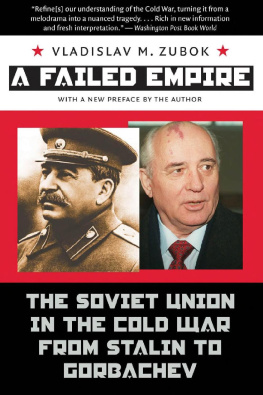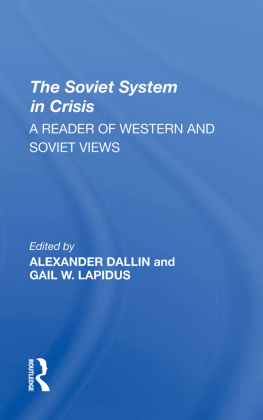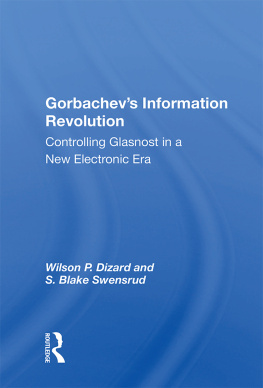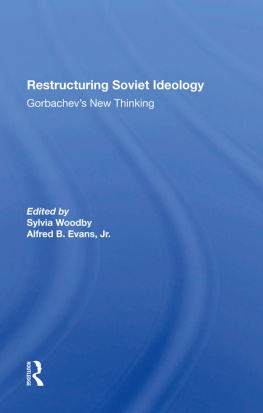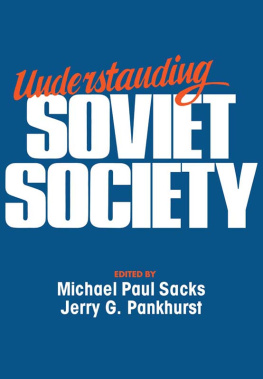Soviet Society and Culture
About the Book and Editors
Academic analysis has not always kept pace with the dramatic changes that have occurred in the USSR since Stalins time, for objective study has often been overshadowedespecially in the 1980sby publicity concerning the negative aspects of the Evil Empire. Recently, however, because of reforms initiated by Gorbachev, the dynamics of the Soviet system have come into sharper focus. This book provides a wide-ranging, detailed view of economic, social, ideological, and literary aspects of the Soviet system leading up to the Gorbachev era.
The essays include both historical and contemporary perspectives on the sources of stability (and stagnation) in the post-Stalin years. Examining the intricate fabric of Soviet society, the contributors provide insights into the social and cultural motivations for Gorbachevs restructuring policies. Their themes echo the work of Vera S. Dunham, who for more than four decades has focused on diverse aspects of Soviet society and culture, particularly on the noncoercive means of social control that have often been overlooked but that are a vital component of the Soviet system.
Terry L. Thompson is an analyst and manager at the U.S. Department of Defense. Richard Sheldon is dean of humanities and professor of Russian at Dartmouth College.
Published in cooperation with the Research Institute on International Change, Columbia University
First published 1988 by Westview Press
Published 2019 by Routledge
52 Vanderbilt Avenue, New York, NY 10017
2 Park Square, Milton Park, Abingdon, Oxon OX14 4RN
Routledge is an imprint of the Taylor & Francis Group, an informa business
Copyright 1988 Taylor & Francis
All rights reserved. No part of this book may be reprinted or reproduced or utilised in any form or by any electronic, mechanical, or other means, now known or hereafter invented, including photocopying and recording, or in any information storage or retrieval system, without permission in writing from the publishers.
Notice:
Product or corporate names may be trademarks or registered trademarks, and are used only for identification and explanation without intent to infringe.
Library of Congress Cataloging-in-Publication Data
Soviet society and culture.
1. Soviet UnionSocial conditions1970 .
2. Soviet UnionPolitics and government19531982.
3. Literature and societySoviet Union. 4. Russian
literature20th centuryHistory and criticism.
5. Dunham, Vera Sandomirsky,1912. I. Thompson,
Terry L. II. Sheldon, Richard (Richard Robert)
HN523.5.S671988 306.0947 87-15936
ISBN 13: 978-0-367-28840-2 (hbk)
Contents
, Seweryn Bialer
Part One
Trends in Soviet Society
, James R. Millar
, Sheila Fitzpatrick
, Peter H. Juviler
John Bushnell
, Michael Paul Sacks
Part Two
Literary Perspectives
, Edward J. Brown
, Richard Sheldon
, Donald Fanger and Gordon Cohen
Part Three
The Language of Ideology
, Alexander Dallin
, Alfred Erich Senn
, Terry L. Thompson
Part Four
Sources of Soviet Stability
, Gertrude E. Schroeder
, Seweryn Bialer
Russia is not fathomed by the mind
Nor by some common standard known;
She is unique in all mankind
Her fate, revealed through faith alone.
F. Tyutchev, 1866
Not many students have had the luck to encounter in their studies a truly great teacher, a model that can shape ones life. Not many scholars have had the luck to have a colleague whose originality of mind and approach can suddenly illuminate in a new way subjects they thought they understood. It is the rare luck of the authors of this book to have met Vera Dunham and to have fallen under her spell.
Veras attitude toward the subject of Russia and its culture is to approach it as a living thing, yet with scholarly rigor, objectivity of judgment, and originality of method and conclusions. She is one of the very few people who know that a true understanding of a society cannot emerge from highly specialized study and narrow professionalism. Understanding must be reached organically. Vera is at the same time a student of Russian and Soviet literature, a sociologist, a psychologist, and a historian. She looks at Russian society through the eyes of its literature, but she explains and evaluates the literature in the social, political, and moral context of the society in which this literature exists.
After talking to Vera or reading her work, in retrospect one is time and again amazed by her intuitive understanding of the mainspring of events. This intuition comes from her total immersion in the subject, from her organic approach to the study of Russia and the Soviet Union, which goes beyond explicit evidence and is heightened by her unwillingness to divorce feeling from form.
Vera intellectually and emotionally is a direct descendent of the great tradition of the Russian democratic intelligentsia. She is motivated in her teaching and writing by the very humanistic ideas and ideals that make people who study Russia love its culture and people even when they hate the system. This is one of the reasons why teaching is for her much more than a profession. It is a passion. This is also why her dramatic teaching style leaves students spellbound and deeply moved wherever she has taught. Vera inevitably infects her students, colleagues, and friends with the aura of excitement that surrounds her.
Veras book In Stalins Time is claimed by many disciplines, but in fact, it is not simply interdisciplinary. I would rather say it is above disciplines and their specialized methodologies. It could have been written only because Veras craft incorporates empathysomething that Max Weber considered absolutely essential for a scholar. Empathy is the ability to look at evidence from the vantage point of the people who live within and create the culture. This empathy does not presuppose, and in Veras case never leads to, an immersion in which she loses her individuality and her independent judgment. Rather, it leads her to judgments that are of universal importance and at the same time genuinely Russian.
This book is the result of an effort by Veras friends to honor her. It includes essays by only a small group of Veras many friends and admirers. By Veras own standards it is inadequate, but it is clearly an expression of love and respect.
Seweryn Bialer
The editors would like to express their deep gratitude to two individuals and two institutions for making this book possible. Professors Sheila Fitzpatrick and Alexander Dallin have been continuing sources of encouragement and support since the inception of the project. Professor Fitzpatrick has been particularly helpful, offering many useful suggestions about the books organization and content. Primary funding for publication was provided by the National Council for Soviet and East European Research and the Research Institute on International Change at Columbia University. Without their support, the book would still be a manuscript in search of a publisher.


